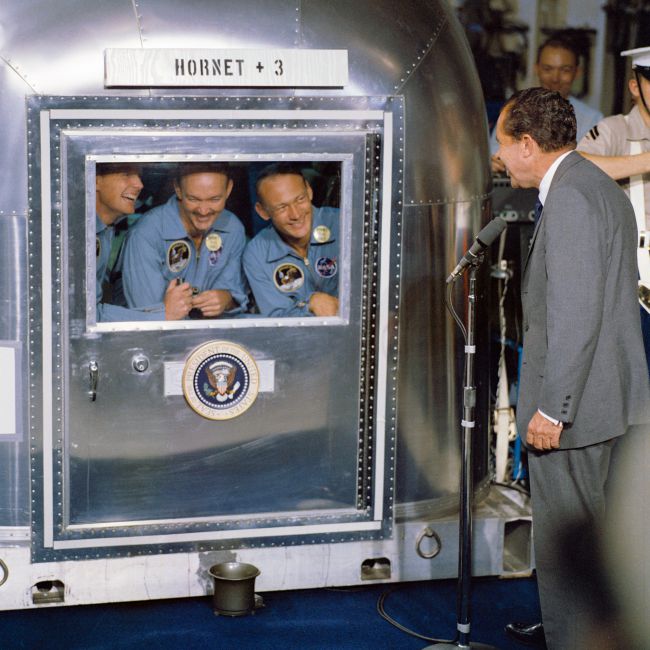The Apollo missions might have exposed our entire planet to 'lunar germs'

A free daily email with the biggest news stories of the day – and the best features from TheWeek.com
You are now subscribed
Your newsletter sign-up was successful
When NASA sent people to the moon for the first time, it took some precautions to make sure that nothing would hitch a ride back. But was it enough?
Footage from a new PBS documentary reveals that Buzz Aldrin and Michael Collins, two out of the three astronauts on the Apollo 11 mission that allowed humanity to walk on the moon for the first time, have their doubts about the sanitation methods NASA used to disinfect them once they were back on Earth.
NASA didn't really believe that any sort of "lunar germs" would infect the astronauts, Space reports; but if there were, they might still be out there. As Collins explained, even though he never set foot on the moon's surface, he would have been exposed to any germs as soon as Aldrin and Neil Armstrong returned to the module that would eventually take them home.
The Week
Escape your echo chamber. Get the facts behind the news, plus analysis from multiple perspectives.

Sign up for The Week's Free Newsletters
From our morning news briefing to a weekly Good News Newsletter, get the best of The Week delivered directly to your inbox.
From our morning news briefing to a weekly Good News Newsletter, get the best of The Week delivered directly to your inbox.
While the astronauts were held in quarantine for 21 days, they still might have contaminated the Pacific Ocean with their space germs. After disinfecting the astronauts on a raft with a cloth, rescue personnel dropped the rag into the ocean — which just "takes all those germs to the bottom of the ocean," Aldrin recounted. "I wonder if they'd survive down there?"
The probable answer is no — which is why NASA dropped its quarantine procedure after the Apollo 14 mission. But if there's something lurking out there, then it's already probably too late for us.
Read more at Space, or catch the documentary Chasing the Moon on PBS this week. It will air on July 8, 9, and 10, at 9 p.m. ET.
A free daily email with the biggest news stories of the day – and the best features from TheWeek.com
Shivani is the editorial assistant at TheWeek.com and has previously written for StreetEasy and Mic.com. A graduate of the physics and journalism departments at NYU, Shivani currently lives in Brooklyn and spends free time cooking, watching TV, and taking too many selfies.
-
 What to know before filing your own taxes for the first time
What to know before filing your own taxes for the first timethe explainer Tackle this financial milestone with confidence
-
 The biggest box office flops of the 21st century
The biggest box office flops of the 21st centuryin depth Unnecessary remakes and turgid, expensive CGI-fests highlight this list of these most notorious box-office losers
-
 The 10 most infamous abductions in modern history
The 10 most infamous abductions in modern historyin depth The taking of Savannah Guthrie’s mother, Nancy, is the latest in a long string of high-profile kidnappings
-
 Key Bangladesh election returns old guard to power
Key Bangladesh election returns old guard to powerSpeed Read The Bangladesh Nationalist Party claimed a decisive victory
-
 Epstein files topple law CEO, roil UK government
Epstein files topple law CEO, roil UK governmentSpeed Read Peter Mandelson, Britain’s former ambassador to the US, is caught up in the scandal
-
 Iran and US prepare to meet after skirmishes
Iran and US prepare to meet after skirmishesSpeed Read The incident comes amid heightened tensions in the Middle East
-
 EU and India clinch trade pact amid US tariff war
EU and India clinch trade pact amid US tariff warSpeed Read The agreement will slash tariffs on most goods over the next decade
-
 Israel retrieves final hostage’s body from Gaza
Israel retrieves final hostage’s body from GazaSpeed Read The 24-year-old police officer was killed during the initial Hamas attack
-
 China’s Xi targets top general in growing purge
China’s Xi targets top general in growing purgeSpeed Read Zhang Youxia is being investigated over ‘grave violations’ of the law
-
 Panama and Canada are negotiating over a crucial copper mine
Panama and Canada are negotiating over a crucial copper mineIn the Spotlight Panama is set to make a final decision on the mine this summer
-
 Why Greenland’s natural resources are nearly impossible to mine
Why Greenland’s natural resources are nearly impossible to mineThe Explainer The country’s natural landscape makes the task extremely difficult